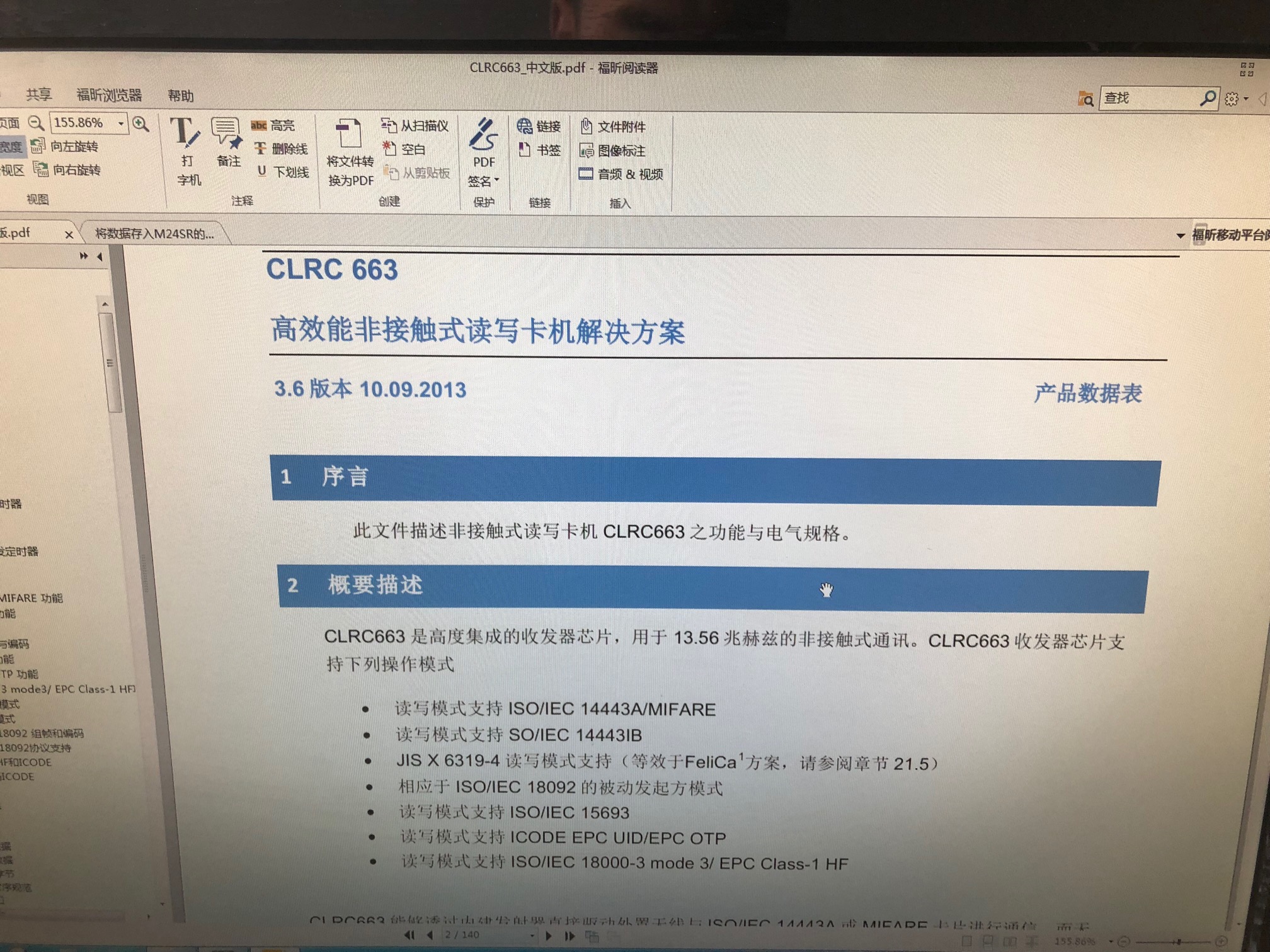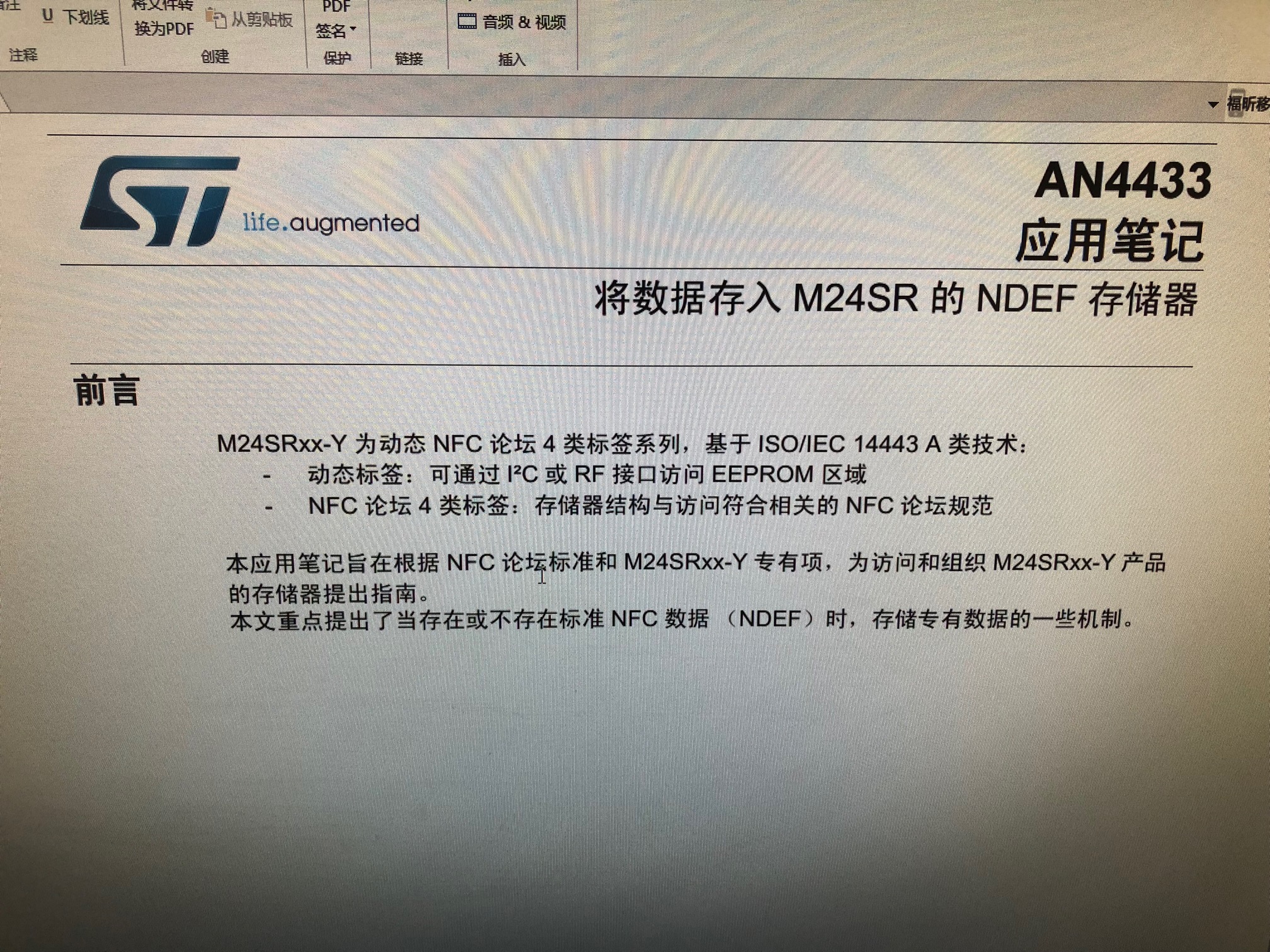使用STM32控制NXP的NFC读卡器芯片CLRC663读写ST公司的NFC标签芯片M24SR64的问题
现在项目上要求把NXP公司的 CLRC663芯片用STM32来控制读写操作
有没有大佬做过这方面的移植啊,
本人对于14443A的协议看得一脸蒙蔽,求大佬们帮帮忙啊,
能读出标签的UID,
我把main函数贴出来了,这是抄的网上的代码,用这个读写NXP 的MIFARE卡没有问题(SAK=0X08);
但是只能读st公司的m24sr(14443A标准)的UID,读写数据就不行,每次执行到
phKeyStore_SetKey 成功(这个函数里面只有支持PH_KEYSTORE_KEY_TYPE_MIFARE的stwch case,其他类型的case都是空 ),但是不知道与me24sr是否符合,
之后
phalMfc_Authenticate函数执行失败,返回0x201或其他非0数值而跳出循环。
这个历程用的官方的库,实在没有办法了,又折腾了一个月了。
跪求大佬拉一波,指个路
/* Includes ------------------------------------------------------------------*/
#include "public.h"
// Forward declarations
static void Fill_Block (uint8_t *pBlock, uint8_t MaxNr);
/* Set the key for the Mifare (R) Classic cards. */
static /* const */ uint8_t Key[6] = {0xFFU, 0xFFU, 0xFFU, 0xFFU, 0xFFU, 0xFFU};
// Don't change the following line
static /* const */ uint8_t Original_Key[6] = {0xFFU, 0xFFU, 0xFFU, 0xFFU, 0xFFU, 0xFFU};
/*******************************************************************************
** Fill Block
** This function is just used to generate some example data for
** write operations on the card.
*******************************************************************************/
static void Fill_Block (uint8_t *pBlock, uint8_t MaxNr)
{
uint8_t i;
for (i = 0; i <= MaxNr; i++)
{
*pBlock++ = i;
}
}
//PA8 蜂鸣、PB5绿灯
extern int32_t BspGetSysTicks(void);
extern uint8_t BspGetDlyTicks(int32_t TicksHome,int32_t Ticks);
#define IndicateON() {GPIO_SetBits(GPIOA,GPIO_Pin_8); GPIO_ResetBits(GPIOB,GPIO_Pin_3);}
#define IndicateOFF(){GPIO_ResetBits(GPIOA,GPIO_Pin_8);GPIO_SetBits(GPIOB,GPIO_Pin_3);}
void GpioInit(void)
{
GPIO_InitTypeDef GPIO_InitStructure;
RCC_APB2PeriphClockCmd(RCC_APB2Periph_GPIOA|RCC_APB2Periph_GPIOB, ENABLE);
GPIO_InitStructure.GPIO_Pin = GPIO_Pin_8;
GPIO_InitStructure.GPIO_Mode = GPIO_Mode_Out_PP;
GPIO_InitStructure.GPIO_Speed = GPIO_Speed_50MHz;
GPIO_Init(GPIOA, &GPIO_InitStructure);
GPIO_InitStructure.GPIO_Pin = GPIO_Pin_3;
GPIO_InitStructure.GPIO_Mode = GPIO_Mode_Out_PP;
GPIO_InitStructure.GPIO_Speed = GPIO_Speed_50MHz;
GPIO_Init(GPIOB, &GPIO_InitStructure);
IndicateOFF();
}
uint32_t BeepDevTicks;
uint8_t BeepFlag;
void BeepON(void)
{
IndicateON();
BeepDevTicks = BspGetSysTicks();
BeepFlag = 1;
}
void BeepRun(void)
{
if(BeepFlag)
{
if(BspGetDlyTicks(BeepDevTicks,20))
{
BeepFlag = 0;
IndicateOFF();
}
}
}
/*******************************************************************************
** Main Function
*******************************************************************************/
uint8_t bHalBufferReader[0x40];
uint8_t bBufferReader[0x60];
uint8_t Win[11]={'W','h','a','t','a','f','u','c','k','e','r'};
uint8_t Rout[11];
int main (void)
{
unsigned int volatile i;
/*BFL(Basic Function Library) data parameter storage*/
phbalReg_Stub_DataParams_t balReader;
phhalHw_Rc663_DataParams_t halReader;
phpalI14443p3a_Sw_DataParams_t I14443p3a;
phpalI14443p4_Sw_DataParams_t I14443p4;
phpalMifare_Sw_DataParams_t palMifare;
phKeyStore_Rc663_DataParams_t Rc663keyStore;
phalMfc_Sw_DataParams_t alMfc;
phStatus_t status;
void *pHal;
uint8_t bSak[1];
uint8_t bUid[10];
uint8_t bMoreCardsAvailable;
uint8_t bLength;
/* Initialize GPIO (sets up clock) */
SystemInit(); //72M
SysTick_Config(720000); //10ms
GpioInit();
//SPI1_Init();
RegCtl_SpiHwInit();
/* Perform a hardware reset */
Reset_RC663_device();
/* Initialize the Reader BAL (Bus Abstraction Layer) component */
phbalReg_Stub_Init(&balReader, sizeof(phbalReg_Stub_DataParams_t));
/* Initialize the Reader HAL (Hardware Abstraction Layer) component */
status = phhalHw_Rc663_Init(&halReader,sizeof(phhalHw_Rc663_DataParams_t),&balReader,0,bHalBufferReader,sizeof(bHalBufferReader),bHalBufferReader,sizeof(bHalBufferReader));
/* Set the parameter to use the SPI interface */
halReader.bBalConnectionType = PHHAL_HW_BAL_CONNECTION_SPI;
/* Set the generic pointer */
pHal = &halReader;
/* Initializing specific objects for the communication with
* Mifare (R) Classic cards.
* The Mifare (R) Classic card is compliant of
* ISO 14443-3 and ISO 14443-4
*/
/* Initialize the 14443-3A PAL (Protocol Abstraction Layer) component */
PH_CHECK_SUCCESS_FCT(status, phpalI14443p3a_Sw_Init(&I14443p3a,sizeof(phpalI14443p3a_Sw_DataParams_t), pHal));
/* Initialize the 14443-4 PAL component */
PH_CHECK_SUCCESS_FCT(status, phpalI14443p4_Sw_Init(&I14443p4,sizeof(phpalI14443p4_Sw_DataParams_t), pHal));
/* Initialize the Mifare PAL component */
PH_CHECK_SUCCESS_FCT(status, phpalMifare_Sw_Init(&palMifare,sizeof(phpalMifare_Sw_DataParams_t), pHal, &I14443p4));
/* Initialize the keystore component */
PH_CHECK_SUCCESS_FCT(status, phKeyStore_Rc663_Init(&Rc663keyStore,sizeof(phKeyStore_Rc663_DataParams_t), pHal));
/* Initialize the Mifare (R) Classic AL component - set NULL because
* the keys are loaded in E2 by the function */
/* phKeyStore_SetKey */
PH_CHECK_SUCCESS_FCT(status, phalMfc_Sw_Init(&alMfc,sizeof(phalMfc_Sw_DataParams_t), &palMifare,NULL));
/* SoftReset the IC.The SoftReset only resets the RC663 to EEPROM configuration. */
PH_CHECK_SUCCESS_FCT(status, phhalHw_Rc663_Cmd_SoftReset(pHal));
/* Read the version of the reader IC */
PH_CHECK_SUCCESS_FCT(status, phhalHw_ReadRegister(&halReader,PHHAL_HW_RC663_REG_VERSION, bBufferReader));
/* Reset the Rf field */
PH_CHECK_SUCCESS_FCT(status, phhalHw_FieldReset(pHal));
/* Apply the type A protocol settings and activate the RF field. */
PH_CHECK_SUCCESS_FCT(status, phhalHw_ApplyProtocolSettings(pHal,PHHAL_HW_CARDTYPE_ISO14443A));
/* Activate the communication layer part 3 of the ISO 14443A standard. */
//BeepON();
while(1)
{
BeepRun();
status = phpalI14443p3a_ActivateCard(&I14443p3a, NULL, 0x00, bUid, &bLength, bSak, &bMoreCardsAvailable);
/* Check if we have a card in the RF field.
* If so, check what card it is. */
if (PH_ERR_SUCCESS == status)
{
/* Check if there is an ISO-4 compliant in the RF field */
if (0x20 == (*bSak & 0x20))
{
//<<<<<<<<<<<<<
//BeepON();
/* Mifare Classic card, set Key Store */
PH_CHECK_SUCCESS_FCT(status, phKeyStore_SetKey(&Rc663keyStore, 0, 0,PH_KEYSTORE_KEY_TYPE_AES128, &Key[0], 0));//663的驱动写的只支持MIFARE类型的秘钥,硬件手册写的支持14443A
/* Authenticate with the Key
* We can authenticate at any block of a sector and we will get the access to all blocks of the same sector
* For example authenticating at block 5, we will get the access to blocks 4, 5, 6 and 7.
*/
/* Send authentication for block 6 */
status = phalMfc_Authenticate(&alMfc, 6, PHHAL_HW_MFC_KEYA, 1, 0, bUid, bLength);
/* Check for Status */
if ((status & PH_ERR_MASK) != PH_ERR_SUCCESS)
{
/* Print Error info */
// DEBUG_PRINTF("\nAuthentication Failed!!!");
// DEBUG_PRINTF("\nPlease correct the used key");
// DEBUG_PRINTF("\nExecution aborted!!!\n");
break;
}
// DEBUG_PRINTF("\nAuthentication Successful");
/* Empty the bDataBuffer */
// memset(bDataBuffer, '\0', DATA_BUFFER_LEN);
// DEBUG_PRINTF("\nRead data from Block 4");
/* Read data from block 4 */
status = phalMfc_Read(&alMfc, 4, Rout);
/* Check for Status */
if (status != PH_ERR_SUCCESS)
{
/* Print Error info */
// DEBUG_PRINTF("\nRead operation failed!!!\n");
// DEBUG_PRINTF("\nExecution aborted!!!\n\n");
break; /* Break from the loop*/
}
// DEBUG_PRINTF("\nRead Success");
// DEBUG_PRINTF("\nThe content of Block 4 is:\n");
// phApp_Print_Buff(&bDataBuffer[0], MFC_BLOCK_DATA_SIZE);
// DEBUG_PRINTF("\n\n --- End of Read Operation --- \n");
// DEBUG_PRINTF("\nWrite data to Block 4");
/* Write data to block 4 */
status = phalMfc_Write(&alMfc, 4, Win);
/* Check for Status */
if (status != PH_ERR_SUCCESS)
{
/* Print Error info */
// DEBUG_PRINTF("\nWrite operation failed!!!\n");
// DEBUG_PRINTF("\nExecution aborted!!!\n");
break; /* Break from the loop*/
}
// debug_printf_msg("ISO-4 compliant card detected");
}
/* Check if th
 发帖
发帖 与我相关
与我相关 我的任务
我的任务 分享
分享
